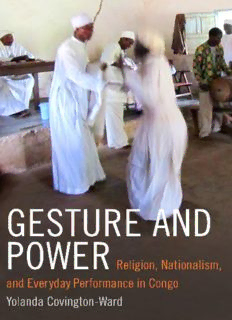
Gesture and Power PDF
Preview Gesture and Power
GESTURE AND POWER The Religious Cultures of African and African Diaspora People Series editors: Jacob K. Olupona, Harvard University Dianne M. Stewart, Emory University and Terrence L. Johnson, Georgetown University The book series examines the religious, cultural, and political expres- sions of African, African American, and African Caribbean traditions. Through transnational, cross- cultural, and multidisciplinary approaches to the study of religion, the series investigates the epistemic boundaries of continental and diasporic religious practices and thought and explores the diverse and distinct ways African- derived religions inform culture and politics. The series aims to establish a forum for imagining the centrality of Black religions in the formation of the “New World.” G E S T U R E P O W E R AND Religion, Nationalism, and Everyday Performance in Congo Yolanda Covington- Ward Duke University Press Durham and London 2016 © 2016 Duke University Press All rights reserved Printed in the United States of America on acid- free paper ♾ Typeset in Minion Pro and Avenir by Graphic Composition, Inc., Bogart, Georgia Library of Congress Cataloging- in-Publication Data Covington-Ward, Yolanda, [date] author. Gesture and power : religion, nationalism, and everyday performance in Congo / Yolanda Covington-Ward. pages cm—(The religious cultures of African and African diaspora people) Includes bibliographical references and index. isbn 978-0-8223-6020-9 (hardcover: alk. paper) isbn 978-0-8223-6036-0 (pbk. : alk. paper) isbn 978-0-8223-7484-8 (e-book) 1. Kongo (African people)—Communication. 2. Body language—Congo (Democratic Republic) 3. Dance—Social aspects—Congo (Democratic Republic) I. Title. II. Series: Religious cultures of African and African diaspora people. 394—dc23 2015020742 Cover art: Weighing of the spirit (bascule) in worship service, dmna Church, Luozi, 2010. Photo by Yolanda Covington-Ward. To my grandmother Nene and my sister- in-law Dell Olivia Attoh CONTENTS Acknowledgments ix Introduction: Gesture and Power 1 I. Performative Encounters, Political Bodies 1. Neither Native nor Stranger: Places, Encounters, Prophecies 37 II. Spirits, Bodies, and Performance in Belgian Congo 2. “A War between Soldiers and Prophets”: Embodied Resistance in Colonial Belgian Congo, 1921 71 3. Threatening Gestures, Immoral Bodies: Kingunza after Kimbangu 107 III. Civil Religion and Performed Politics in Postcolonial Congo 4. Dancing with the Invisible: Everyday Performances under Mobutu Sese Seko 137 5. Dancing Disorder in Mobutu’s Zaire: Animation Politique and Gendered Nationalisms 165 Part IV: Re- creating the Past, Performing the Future 6. Bundu dia Kongo and Embodied Revolutions: Performing Kongo Pride, Transforming Modern Society 187 Conclusion: Privileging Gesture and Bodies in Studies of Religion and Power 227 Glossary 233 Notes 235 References 253 Index 275 ACKNOWLEDGMENTS First, I must thank God for bringing me this far. Next, I thank my family for supporting me, from ces 110x in the Bronx all the way to the tenure track at the University of Pittsburgh. My grandmother Nene; my mother, Diane Covington, and father, Roger Dixon; my siblings: Tavi, Dana, Nyesha, Brandon, Michelle, Taurean, and Tristan; all my aunts and uncles, especially Sony, Audrey, Danny, Tony, Shirley- Mae, JoAnn, Abby, Duke, and Dionne; all my many cousins, especially Chris and Leisa; my mother- in-law, Teeta, and sister- in-law Dell—indeed, the whole village. I must thank many people who have contributed to the book’s develop- ment: my dissertation committee at the University of Michigan: Elisha Renne, Kelly Askew, Tata Mbala Nkanga, Maxwell Owusu, and Julius Scott. I also thank the Department of Anthropology, especially Laurie Marx, and the Department (then Center) for Afroamerican and African Studies, espe- cially Kevin Gaines, Mamadou Diouf, Devon Adjei, Beth James, and Chuck Phillips. My fellowship at the Institute for the Humanities enabled me to complete the writing of my dissertation. I am grateful to all my colleagues (past and present) in the Department of Africana Studies at the University of Pittsburgh: Brenda, Jerry, Christel, Michael, Oronde, Michele, Cecil, Joseph, Kwame, and Vernell for their support. There are so many people that impacted and facilitated my research in the Congo: Tata Fu- Kiau Bunseki, may he rest in peace; Professor Kimpianga Mahaniah—a great resource and support to me both in Luozi and Kinshasa. Ne Nkamu Luyindula—thank you for the Kikongo, drumming, and dance lessons and the late- night debates. In Luozi: Pere Blaise and the Catholic mis- sion; the Luyobisa family (Pa Luyobisa, Ma Suzanne, and the children); the
Description: